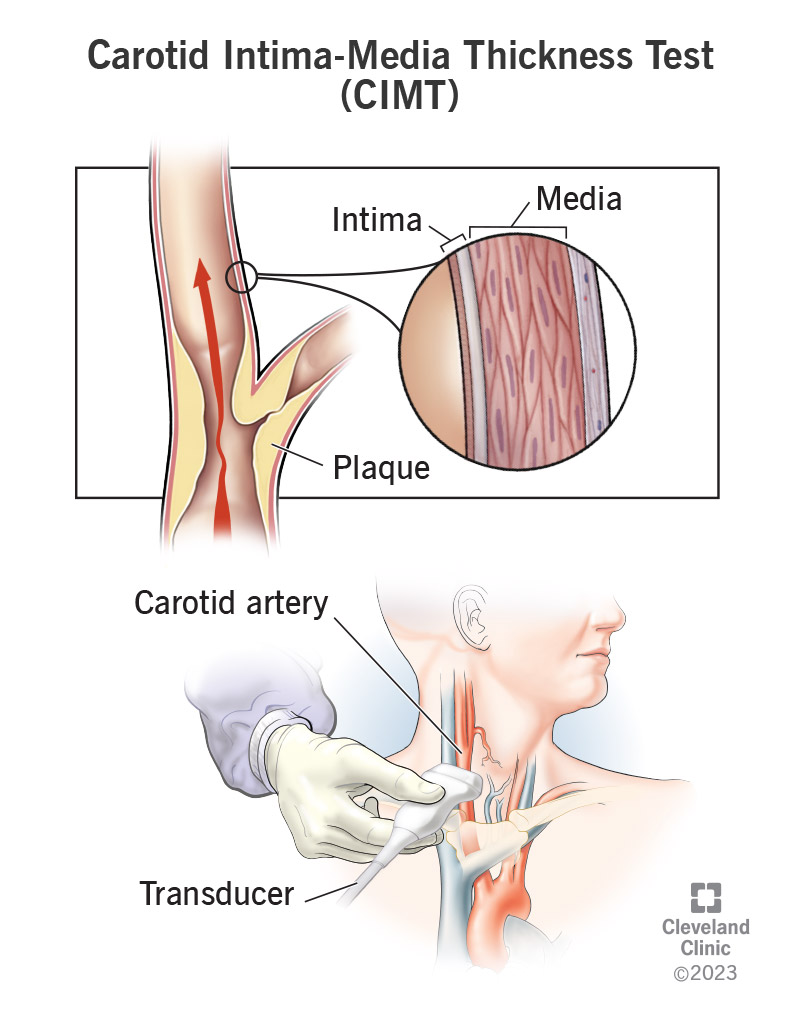A carotid intima-media thickness (CIMT) test is a quick and painless test that measures the thickness of your carotid artery wall. Plaque buildup in your carotid artery can cause the wall’s inner layers to grow thicker over time. Increasing thickness may signal an elevated risk for cardiovascular disease. Your healthcare provider will create a treatment plan based on your test results.
Advertisement
Cleveland Clinic is a non-profit academic medical center. Advertising on our site helps support our mission. We do not endorse non-Cleveland Clinic products or services. Policy

Image content: This image is available to view online.
View image online (https://my.clevelandclinic.org/-/scassets/images/org/health/articles/24944-carotid-intima-media-thickness-test)
A CIMT test, also called a CIMT ultrasound scan, is a test that measures the thickness of the two inner layers of your carotid artery wall. Your carotid arteries are major blood vessels in your neck that supply oxygen-rich blood to your brain, head and face.
Advertisement
Cleveland Clinic is a non-profit academic medical center. Advertising on our site helps support our mission. We do not endorse non-Cleveland Clinic products or services. Policy
The goal of a CIMT test is to evaluate the amount of plaque buildup in your carotid artery walls. Your healthcare provider can use this information to determine your risk for a heart attack, stroke and other cardiovascular issues.
CIMT stands for “carotid intima-media thickness.” The intima is the innermost layer of your artery wall. It comes into direct contact with your blood as it flows through your artery. The media is the middle layer of your artery wall.
The thickness of these layers is important because it can signal the presence of atherosclerosis (plaque buildup), including in its earliest stages before you have any symptoms. Plaque buildup makes your artery wall thicker than it should be. As atherosclerosis advances, your risk for cardiovascular disease increases.
A CIMT test is one piece of the risk assessment puzzle. It helps your provider develop a treatment plan, including medications and other preventive measures, to lower your risk of cardiovascular disease.
Your healthcare provider may order a CIMT test if you have risk factors for atherosclerosis. These include:
Advertisement
A CIMT test uses ultrasound technology to create images of your artery layers. This is a noninvasive test, meaning a provider performs the test on the outside of your body. You shouldn’t feel any pain or discomfort.
An ultrasound technician (technologist) performs this test. They’re a healthcare provider specially trained in doing ultrasound tests. Here’s a brief overview of how a CIMT test works:
An ultrasound technician gently presses a hand-held device called a transducer against different areas on your neck. The transducer generates high-frequency sound waves (ultrasound). These waves enter your neck and bounce off the structures inside it (including your carotid arteries). The transducer captures these resulting “echoes” and sends them to a computer. The computer measures the echoes and transforms them into pictures that the technician can save.
There’s nothing you need to do to prepare for this test. But you may wish to wear comfortable, loose clothing. That’s because the technician will need to move the transducer around on your neck. So, a shirt with a loose, open collar or buttons might help them access the area more easily.
A CIMT test takes about 30 to 45 minutes. To perform this test, a technician will:
The technician will tell you when the test is done. You’ll be free to leave and go about the rest of your day.
Researchers haven’t identified any risks. A CIMT test is safe and noninvasive. It doesn’t use radiation.
A CIMT test measures the thickness of the two inner layers of your carotid artery. The test produces images and numbers that a radiologist will interpret. A radiologist is a medical doctor who reads and interprets medical images, including ultrasound images.
The radiologist will send this information to your primary care physician or cardiologist, who’ll then share the information with you.
Your provider will tell you when you can expect your test results.
Advertisement
Based on your test results, your provider may recommend medications and/or lifestyle changes to lower your risk for a heart attack, stroke or other issues. For example, they may prescribe medication to lower your blood pressure or manage your cholesterol levels. They may also recommend an exercise routine or a heart-healthy eating plan (like the Mediterranean diet).
Call your provider if you have questions or concerns about the results of your CIMT test or your treatment plan.
A CIMT (carotid intima-media thickness) test allows your provider to recognize early signs of plaque buildup in your carotid arteries. This information can help them develop a plan to lower your risk of cardiovascular disease complications down the road.
It’s common to feel nervous when going in for any test or procedure. But you can rest assured that a CIMT test is quick, painless and noninvasive. The knowledge your provider gains from the test can be life-saving.
Advertisement

Sign up for our Health Essentials emails for expert guidance on nutrition, fitness, sleep, skin care and more.
Learn more about the Health Library and our editorial process.
Cleveland Clinic’s health articles are based on evidence-backed information and review by medical professionals to ensure accuracy, reliability and up-to-date clinical standards.
Cleveland Clinic’s health articles are based on evidence-backed information and review by medical professionals to ensure accuracy, reliability and up-to-date clinical standards.
Vascular disease may affect your life in big and small ways. Cleveland Clinic’s specialists treat the many types of vascular disease so you can focus on living.
